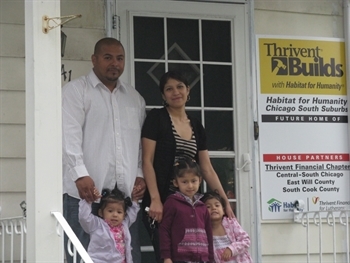 By Melvin Thompson
By Melvin Thompson - October 3, 2011
Melvin R. Thompson is director of development for Habitat for Humanity Chicago South Suburbs.
In 1985, the United Nations declared the first Monday in October "World Habitat Day," in recognition of the need for simple and decent shelter for people in the United States and around the world. At a time when many American families are struggling to keep the roof over their heads, it’s clear we still need to recognize this day.

Photo courtesy HFHCSS
Indeed, it was the collapse of the housing market that led our nation down this rocky economic path. Now we know in very real terms that stable, affordable places to live yield much more than just a roof over one’s head. (And if we need a report to remind us, a recent
Center for Housing Policy study strongly suggests a good home contributes comprehensively to a healthier family environment.)
Here in the south suburbs of Chicago, the dire state of housing and the economy is well documented. In terms of resources, the entire region find itself in the proverbial same boat.
In Mary Sue Barrett’s thoughtful and inspiring blog entitled, "Breaking down barriers to opportunity," she shared how the Chicagoland area is utilizing multi-town collaboration, an innovative model for greater access to inclusive, sustainable and economically competitive community development. Ms. Barrett also lauded Habitat for Humanity Chicago South Suburbs (HFHCSS) for partnering with the Village of Park Forest on foreclosure recovery. Born out of the South Suburban Housing Collaborative, the partnership already has yielded great results: In June, two families realized the dream of owning their own homes after moving into formerly foreclosed homes they helped rehabilitate themselves with the help of Habitat.
At HFHCSS, we are actively engaged not only in serving more families, but in revitalizing the communities in which we serve. Through the Neighborhood Revitalization Initiative, Habitat has expanded its array of services to include home renovation, repair and weatherization. Consistent with our lifelong mission to eradicate poverty housing and substandard living, we are especially excited about providing location efficient, affordable housing on a larger scale and a wider basis.
Yet the opportunity – the challenge – to do more with less is not lost at Habitat. As Ms. Barrett reminded us, scarcity is the platform through which creativity can flourish. Local capacity building is the key.
As the newly minted development director at HFHCSS, I recently had the pleasure of attending a Capacity Building Conference at our headquarters in Atlanta, Georgia where the underlying theme was – what else? -- collaboration. Absent these collaborative efforts, it is difficult to imagine a recovery of any real substance.
So when we ask, “Who will ultimately restore our economy?” the answer is: Collaboratively, we all will. As Ms. Barrett suggests, the lines have blurred. Here in the Chicago South Suburbs, as we work to restore our communities and do more with less, it’s clear that Interjurisdictional Collaboration is mission critical.